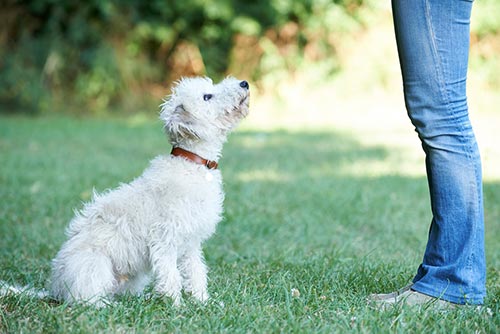Types of Dog Trainer Certification
 Because the field of dog training is largely unregulated, attempting to understand the various types of dog trainer certification currently available can often be a confusing and muddy exercise. Learn more about what dog training certification is here.
Because the field of dog training is largely unregulated, attempting to understand the various types of dog trainer certification currently available can often be a confusing and muddy exercise. Learn more about what dog training certification is here.
While specific nomenclature and designations vary by country, most dog trainer schools provide some level of self-defined certification for their graduates. Some certifying organizations also exist in various countries (separate from any educational institution), while other organizing bodies serve as mere associations without any certification required for membership.
In the USA, the Certification Council for Professional Dog Trainers (CCPDT), the International Association of Animal Behavior Consultants (IAABC) and the Pet Professional Accreditation Board (PPAB) are several of the best-known certifying organizations for dog trainers.
In the UK, the IAABC, PPAB, and the Association of Pet Dog Trainers (APDT) – not to be confused with the US-based non-certifying membership organization of the same name – are a few of several positive training-based organizations which offer certifications without education. One exciting development in the UK is the founding of the UK Dog Behaviour and Training Charter – a nationally-recognized organization comprised of leading entities including VSA and VSPDT dedicated to providing accountability and a level of trust for the UK dog-owning public. VSA and VSPDT are founding members of the charter, and VSA graduates enjoy charter membership based on their ongoing credentialing via VSA.
There are other certifying bodies in the US and the UK, but in VSA’s opinion, many of them either have qualifying standards lower than we recommend and/or they promote and condone dog training tools, philosophies and methods that are widely considered outdated and potentially harmful to dogs’ well-being.
Other countries have similar types of certifying entities as well.
Finally, there are a handful of ‘lettered behaviorist’ designations such as Applied Animal Behavior Certification (CAAB) and organizations such as the American College of Veterinary Behaviorists (ACVB) which are certifying boards for veterinarians and PhDs that are specially trained to advance the behavioral health of animals. Most of these designations require advanced degrees and in many cases are only available for graduates of actual veterinary schools.
 VSA is a leading member of a coalition of international animal behavior organizations committed to increasing clarity and understanding among the public regarding labels for dog training and behavior professionals by clearly defining the roles, skill levels, and nomenclature for those working in the field of animal behavior. The coalition is working to institute a wide-ranging agreement to defining the various levels of animal behavior professionals as follows:
VSA is a leading member of a coalition of international animal behavior organizations committed to increasing clarity and understanding among the public regarding labels for dog training and behavior professionals by clearly defining the roles, skill levels, and nomenclature for those working in the field of animal behavior. The coalition is working to institute a wide-ranging agreement to defining the various levels of animal behavior professionals as follows:
- Dog Trainer. This level includes those working professionally to teach basic manners behaviors and general dog behavior issues.
- Dog Trainer & Behavior Specialist. This level includes all skills from the Dog Trainer status but also includes knowledge regarding more advanced behavior issues such as anxiety, aggression, reactivity and more.
- Boarded Behaviorist. This level represents those having received designations requiring advanced degrees (PhDs, veterinarians, etc) and the highest level of learning regarding behavioral health.
VSA graduates are certified in the ‘Dog Trainer & Behavior Specialist’ category.
The Victoria Stilwell Academy’s VSA-Certified Dog Trainer (VSA-CDT) designation represents the successful completion of VSA’s rigorous and advanced study of dog training and animal behavior. This certification carries with it VSA’s well-known reputation as a leading dog training educational institution, and those who earn it are recognized for professionalism in the field of dog training, having been deemed by VSA to possess the skills, knowledge and experience to help both dogs and owners with their dog training and behavior needs.
VSA is a state-licensed and authorized qualified educational institution under the Nonpublic Postsecondary Education Institutions Act of 1990.


